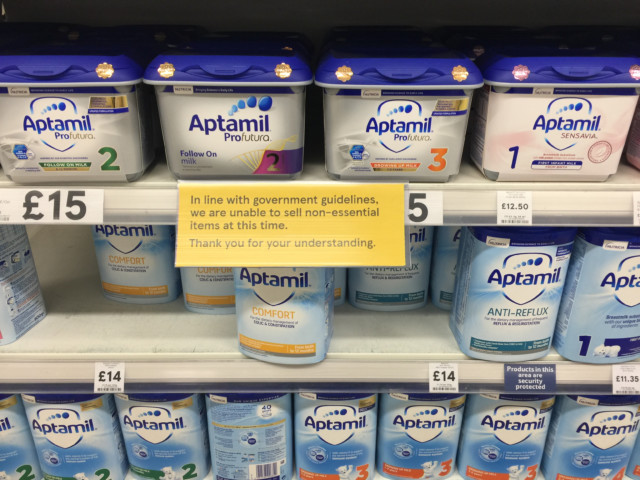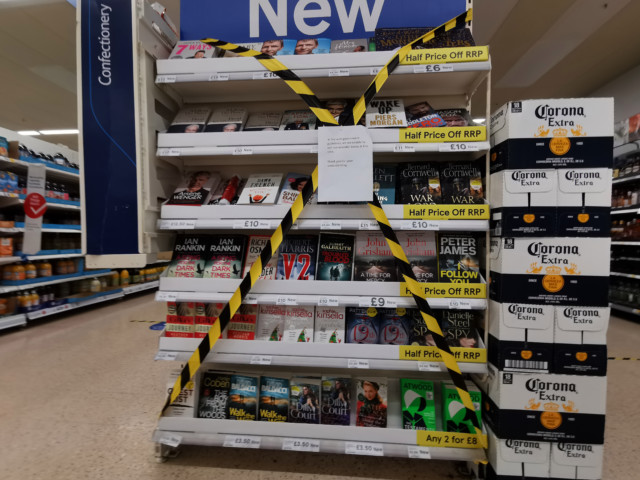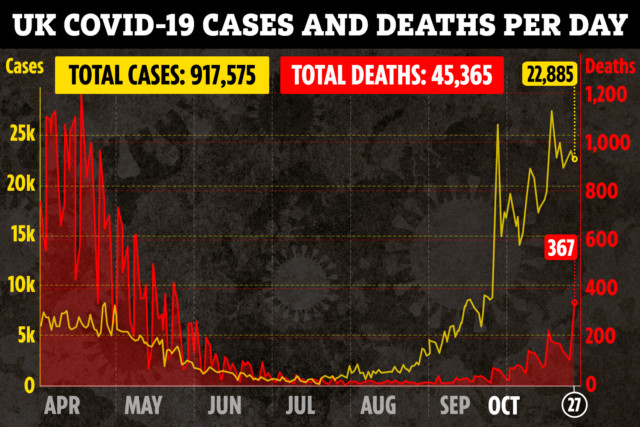THE Welsh Government has issued a list of approved ‘essential’ items and has said shops CAN use ‘discretion’ on selling non-essential items during the lockdown.
Ministers have doubled down on the measures after an almighty spat over supermarkets refusing to sell sanitary pads and baby milk during the “firebreak” lockdown.
Mark Drakeford told shops to use “discretion” in selling non-essential items
 Baby milk was given a “non essential” tag in one Tesco – but it has now been added to the essential list
Baby milk was given a “non essential” tag in one Tesco – but it has now been added to the essential list
 Books have also been deemed “non-essential” but beer and alcohol is allowed
Books have also been deemed “non-essential” but beer and alcohol is allowed
The list of ‘essential’ items that can be bought at Welsh supermarkets has now been expanded to include baby milk and clothes.
The Welsh Government said on Tuesday it had “positive discussions” with essential retailers and trade unions over the rules.
But restricting goods in supermarkets will remain in place until the end of the lockdown on November 9.
Now, there are 10 types of products that can be sold in Wales – including food and drink, and items “ancillary to the sale of food and drink” which includes kitchen foil and cling film.
Supermarkets can also sell toiletries and cosmetic products, including sanitary products – as well as baby products including equipment, clothes and nappies.
This latest list comes after Mr Drakeford said last night: “I recognise that there will be some people who for entirely unexpected reasons which they couldn’t have foreseen will need to buy items.
“In those circumstances where those welfare reasons are at stake, we will make sure that our supermarkets understand they have the discretion to apply the rules differently.
He added: “Supermarkets can sell anything that can be sold in any other type of shop that isn’t required to close. In the meantime, please only leave home if you need to.”
Wales’s “firebreak” lockdown means non-essential retail, pubs, restaurants and gyms will all have to close until November 9 in an attempt to quell growing infection rates.
People have been given fresh stay at home orders and told not to go on long journeys.
Schools will close over the half term – this week – and all pupils below Year 8 will be able to go back to classrooms next week.
But older students must return to remote learning.
In a climbdown yesterday, the Welsh Government said yesterday it would speak to the retail sector to make sure the policy banning the sale of “non essential items” – intended to keep shop visits short – was being applied sensibly.
It comes after stacks of baby milks were slapped with a sign deeming them “non essential”, causing fury from mothers
And yesterday Welsh shopper Katie was furious when she discovered she could not buy sanitary towels at the supermarket.
Tweeting the supermarket giant to complain, posting: “Can you explain why I was told today that I can’t buy PERIOD PADS as I’m sure they are essential to women ?!!!
SUPERMARKET SPAT
“But I can buy alcohol – it doesn’t make sense.”
Tescos was given a slap down by the Welsh Government after it claimed on Twitter they had been “not to sell these items for the duration of the firebreak lockdown.”
Shadow health minister for the Welsh Conservatives Andrew RT Davies said the ban on supermarkets in Wales selling non-essential items during the country’s firebreak lockdown “must be dropped today”.
Mr Davies said the “chaos and confusion” of a woman incorrectly being told she could not buy sanitary products at a supermarket was a direct result of the ban.
“This ludicrous policy has caused real anger and it’s not fair on staff working in our supermarkets and the general Welsh public who are now at their wits’ end with Labour ministers,” he added.
And groups which represent supermarkets and shops called for the controls to be scrapped and individuals be allowed to buy what they want.
CBI Wales, the Welsh Retail Consortium, and the Association of Convenience Stores, said: “We recommend the individual customer is trusted to make their own decision as to whether a product is non-essential or not, taking into account the notices displayed throughout the store and their immediate needs.
“If the customer goes ahead with the purchase of the item the final liability ought to rest with the customer.”
It added: “These recommendations would mean non-essential items are not removed from shelves, or cordoned off in stores, but large notices are placed in front of the products and in communal spaces informing customers of the Welsh Government’s regulations and the Welsh public are trusted to make the right decision.
“We look forward to engaging with Welsh Government again this morning and we hope consensus can be reached.”












